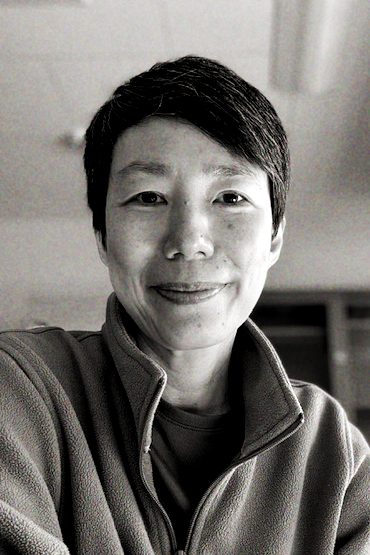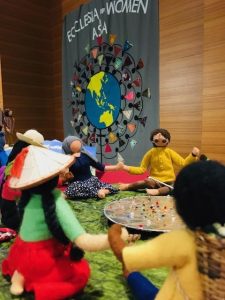Sharon Adeline Bong
VISITOR’S VOICE
Interview with Sharon Adeline Bong »

Exploring the Intersection of Gender, Ecology, and Religion
01
Please tell us about your research.
My current research project at CSEAS is titled “Queer ecofeminism in Southeast Asia.” Like a favorite dish, it has my favorite ingredients; gender, ecology, and religion. I am excited about exploring the connection between those who care for the sustainability of the earth and those who respect the diversity of genders, and who do so from their various faith traditions of Islam, Christianity, Buddhism, Confucianism, and so on.
02
How many research themes do you have?
The research focuses on the intersection of climate justice and gender justice. These are the two broad themes. Climate justice includes the awareness that some are more disproportionately affected by climate change and that efforts to address this must be human-centered, working from the margins as this is where the poor and vulnerable are. Gender justice is directed at those who are marginalized (e.g., treated poorly in their own homes, bullied at schools, harassed in the streets and at workplaces, etc.) on account of their sexual orientation, gender identity and expression, or sex characteristics.
03
Why do you find your research topic interesting?
I find the research not only interesting, indeed fascinating, but also inspiring and healing. Much of the world is focused on realizing the United Nations 17 Sustainable Development Goals. But there are many whose everyday living is connected to the earth, as they not only live sustainably, but also ethically toward each other. Related readings lead us to further inspiration in practices of veganism, defending animal rights, and others.
04
How did you get started in your research, and how did you come to focus on your current research?
I was inspired by my previous research on eco-theologies from a Catholic faith tradition, in which I critically analyzed Pope Francis’ encyclical Laudato Si, which is given the nickname the “green encyclical” (letter) because it calls on each of us to better care for the earth, its resources, and all who inhabit it. I noted that a shortcoming of the Christian worldview is that the human person is placed at the center of the ecosystem as superior to other living creatures, which has brought about much ecological damage, most of it irreversible. In my current research, I turn to other faith traditions, for instance, Buddhism, which emphasize connectivity between and among all sentient and non-sentient beings.
05
Have you had any difficulties in putting together the results of your research into a research paper or book?
It is less of a with difficulty than it is a challenge to weave together the key materials gathered. These include what experts have previously discovered (literature review), your own data (e.g., in-depth interviews and statistics), and how you make sense or interpret the data (data analysis). The last process is especially important, as you want to privilege how your research subjects make sense of their own lived realities. As a full-time academic, it is often difficult to find the time and space to delve into research as one does as a PhD student. This time at CSEAS is highly treasured as I am on sabbatical (study leave).
06
Can you share with us an episode about any influential people, things, and places you have encountered whilst doing your research?
I consider meeting “heavy weights” such as the feminist theologians Elisabeth S. Fiorenza and Kwok Pui Lan in the flesh as highlights.
07
Which books or people have influenced you?

When I encountered a group of women theologians who are both feminist and Catholic, and living in Asia, I felt like I had come home. We are called the Ecclesia of Women in Asia. Once every two years, we organize an international conference and selected papers are published. The publications address an important gap in literature, i.e., the lack of feminist theological voices from Asia. These feminists, women like me, continue to inspire me.
08
What is your ideal image of a researcher?
To me, an ideal researcher is someone who continues to have a sense of awe and wonder at the world around us. And quite importantly, they have a strong sense of social justice. This is the type of research that I have come to find more worthwhile in my own journey in moving from dead poets (as a student of English Literature) to living narratives (as a scholar of gender and religious studies).
09
Do you have any must-have gear for field research and writing?
My recording device and umbrella. I never leave home without the latter!
10
Do you have any essential reads (books) that you can recommend to younger people?
The list is too long and diverse! Top of mind would be theological writings by feminist and queer theologians that take courage to write. These question why unfair structures exist both within the Church and outside the Church. They include but are not limited to the works of Agnes Brazal, Kwok Pui Lan, and Joseph N. Goh.
11
Do you have any advice for those who aim to become researchers?
Follow your heart. And know when to play the game (in academia) and when not to.
12
What are your future ambitions as a scholar?
I am fortunate to already realize some of my professional ambitions, as my research expertise is recognized by other scholars whose work I cite and seek to emulate. I know that today, 20 years after having completed my PhD, I have left behind a rich legacy of publications and have inspired my students, both undergraduate and postgraduate, to do something worthwhile with their lives.
(January 2023)
Sharon Adeline Bong is a Visiting Research Scholar of CSEAS
from January 2023 – March 2023